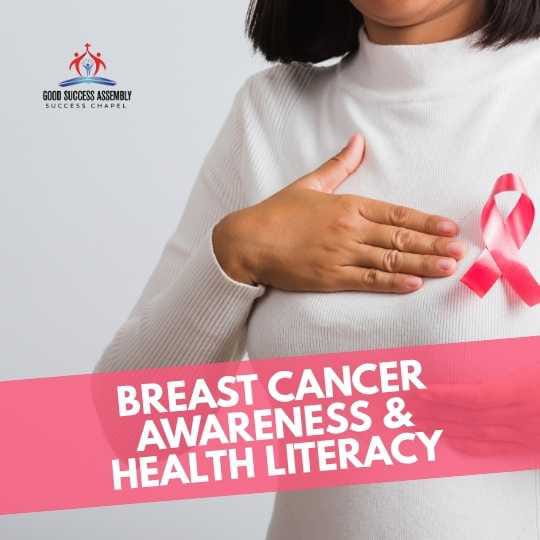The Wellness Corner
3 John 1:2 – “Beloved, I pray that in every way you may succeed and prosper and be in good health [physically], just as [I know] your soul prospers [spiritually].”
Breast Cancer Awareness Month & Health Literacy Month
This October, we recognize Breast Cancer Awareness Month and Health Literacy Month—two important reminders to take charge of our health and support others in doing the same.
Breast Cancer Awareness: Early Detection Saves Lives
Breast cancer is one of the most common cancers among women, but it is treatable—especially when caught early.
Tips for Prevention and Early Detection:
- Perform regular self-breast examsand report any changes (lumps, discharge, or skin changes) to your doctor.
- Get your mammogram—women aged 40 and older should speak with their provider about mammograms. Those with a family history may need earlier screening.
- Maintain a healthy lifestyle—exercise, eat nutritious foods, maintain a healthy weight, avoid smoking, and excessive alcohol use.
- Encourage loved onesto stay on top of their screenings too—early action can save a life.
- Breastfeeding—breastfeeding is associated with a reduction in the risk of breast cancer. It’s advisable to breastfeed your baby for as long as possible.
- Treatment—there are no scientifically proven herbs that can prevent or cure cancer. If you notice any symptoms related to breast cancer (e.g. lump in the breast, nipple pain, redness of nipple/breast skin, unusual nipple discharge), it’s crucial to consult your physician promptly. Early detection can save your life. During breast cancer treatment, it’s essential to complete your medication regimen. Collaborate with your physician and pharmacist to manage your medication(s) and potential side effects effectively.
Health Literacy Month: Understand To Take Charge
Health literacy is the ability to read, understand, and use health information to make good decisions for yourself and your family. Without it, people may skip screenings, misuse medications, or misunderstand diagnoses.
Ways to Build your Health Literacy:
- Don’t be afraid to ask questions – If something is unclear, speak up during appointments.
- Take notes or bring support – Write down what your healthcare provider says or bring someone to help you remember.
- Use simple, trustworthy sources – Rely on resources like your healthcare provider, the CDC, or health.gov for accurate information.
- Know your numbers – Understand your blood pressure, blood sugar, cholesterol, and BMI—and what they mean for your health.
- Keep records – Maintain a medical diary to record health details like daily blood pressure, blood sugar, illnesses, medications, lab results, allergies, vaccinations, surgeries, and other personal health information. This helps track health patterns, trends, progress, and adjustments, and provides valuable information for your healthcare provider.
This October, let’s lift up one another with awareness, compassion, and knowledge. Whether it’s by scheduling a screening, helping someone understand their diagnosis, or simply starting a conversation, you have the power to make a difference.
If you have any questions or concerns, please consult your healthcare practitioner.
Stay well and be blessed,
Dr. Funmi Kayode (MD) and Dr. Bukola Folorunso (PharmD)



